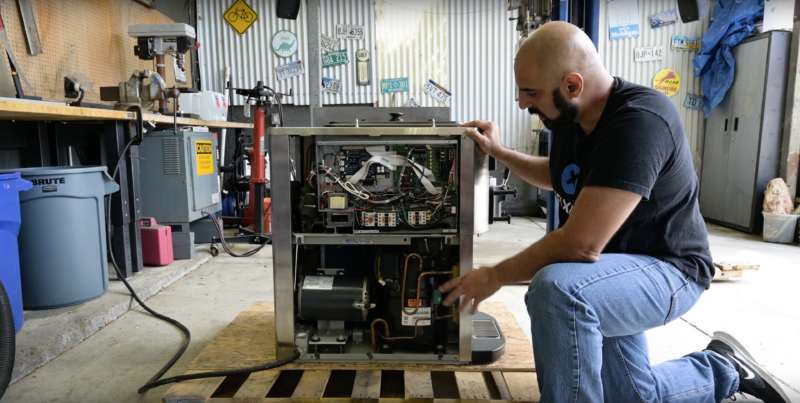
McDonald’s soft-serve ice cream machines are regularly broken, and it’s not just your perception. When repair vendor and advocate iFixit was filming a video about the topic, it checked tracking map McBroken and found that 34 percent of the machines in the state of New York were reported inoperable. As I write this, the nationwide number of broken machines is just above 14 percent.
To improve the nation’s semi-frozen milk fat infrastructure, iFixit has done two things. One, as first reported by 404 Media, is to join with interest group Public Knowledge to petition the Copyright Office for an exemption allowing people to fix commercial equipment, such as McDonald’s ice cream machines and other industrial kitchen equipment, without fear of reprisal under Section 1201 of the DMCA.
The other is to obtain one of the Taylor ice cream machines used by McDonald’s franchises, tear it down, and marvel at how it could be so unreliable.
In the iFixit teardown video above, Shahram Mokhtari starts the Taylor C709 Soft Serve Freezer, then encounters “error after error” during what was supposed to be a four-hour warm-up cycle, but which goes on far longer. Noting that Taylor purportedly makes 25 percent of its profits from service calls and charges $350 per 15 minutes of service, the obscurity of the error codes, even with a manual handy, seems “like a right to repair issue,” Mokhtari says.
One tiny company had previously attempted to address the glut of broken, indecipherable Taylor machines and was duly ostracized for its efforts. The Kytch, based on a Raspberry Pi, offered McDonald’s franchisees insight into both their machines’ operation and failures. It could also override locks that prevent the machines from working due to non-critical errors.
Taylor, which reportedly has an exclusive contract with McDonald’s for maintenance of its machines, moved quickly to make the use of a Kytch a contract-voiding, franchise-ending issue. The saga, as reported by Wired, has taken a few intriguing turns, including Taylor’s creation of a competing product, revealing discovery emails, and a $900 million Kytch lawsuit.
Public Knowledge and iFixit have submitted a petition to the Copyright Office to argue that bypassing the digital security measures on commercial equipment such as Taylor’s machines should not be illegal. The petition also provides automated building management systems as an example of systems that should offer repair bypass.
“In principle, copyright should not prevent anyone from repairing a device they own regardless of whether that device is consumer or commercial,” Kathleen Burke, policy counsel at Public Knowledge, said in a statement. “The fact that this principle is not already embedded permanently into law demonstrates that our copyright system is as McBroken as the average McDonald’s ice cream machine.” (Link added by Public Knowledge.)
How easy would it be for an intrepid McDonald’s franchisee to fix their machine, should they have real access to it? The machine is a compressor (though many times the power of your home fridge), a motor, a belt, a churning bin, three printed circuit boards and power relays, a dispensing agitator, and a display. There’s no particular reason it should fail at the rate it does, iFixit posits, except for its tendency to overheat under repeated use and its programming that shuts it down whenever a cycle goes awry. Having a better read on what’s happening inside, it seems, would go a long way toward better service uptime.
iFixit notes that even if the Copyright Office granted its repair exemption, that would only allow individual ice cream machine owners to figure out a way to hack past their machine’s limits. To distribute software, or tools like the Kytch, would require a change to Section 1201 of the DMCA itself. iFixit plans to work with representatives to reintroduce the Freedom to Repair Act in Congress this year for that purpose.
The Copyright Office considers exemptions to the Digital Millennium Copyright Act once every three years. After hearing from petitioners and stakeholders, the Register of Copyrights submits recommendations to the Librarian of Congress, which then adopts them. Public Knowledge and iFixit previously won exemptions for repairing game consoles in the last round of exemptions but with similar inherent restrictions on actually distributing tools for bypassing blocks.
Disclosure: Kevin Purdy previously worked for iFixit. He has no financial ties to the company.
https://arstechnica.com/?p=1964112

